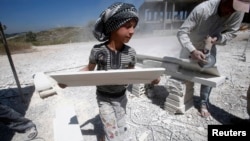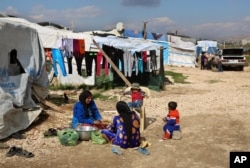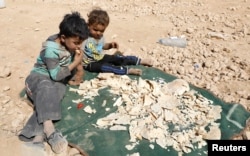Nearly seven years into Syria's civil war, Syrian refugees in neighboring Lebanon are becoming poorer, leaving children at risk of child labor and early marriage, aid organizations said on Tuesday.
A recent survey by the United Nations children's agency UNICEF, U.N.'s World Food Program, and refugee agency, UNHCR showed that Syrian refugees in Lebanon are more vulnerable now than they have been since the beginning of the crisis.
Struggling to survive, more than three quarters of the refugees in Lebanon now live on less than $4 per day, according to the survey which was based on data collected last year.
"The situation for Syrian refugees in Lebanon is actually getting worse - they are getting poorer. They are barely staying afloat," Scott Craig, UNHCR spokesman in Lebanon, told the Thomson Reuters Foundation.
Around 1.5 million refugees who fled Syria's violence account for a quarter of Lebanon's population.
The Lebanese government has long avoided setting up official refugee camps. So, many Syrians live in tented settlements, languishing in poverty and facing restrictions on legal residence or work.
"Child labor and early marriage are direct consequences of poverty," Tanya Chapuisat, UNICEF spokeswoman in Lebanon said in a statement to the Thomson Reuters Foundation.
"We fear this (poverty) will lead to more children being married away or becoming breadwinners instead of attending school," she said.
According to UNICEF, 5 percent of Syrian refugee children between 5-17 are working, and one in five Syrian girls and women aged between 15 and 25 is married.
Mike Bruce, a spokesman for the Norwegian Refugee Council, said without sufficient humanitarian aid and proper work Syrian families would increasingly fall into debt and more could turn to "negative coping mechanisms" like child labor and marriage.
Cold winter temperatures in Lebanon would also hurt refugees, he said.
"Refugees are less and less able to deal with each shock that they face and severe weather could be one of those shocks," said Bruce.







